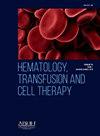评估巴西一家大学医院接受治疗的患者的红细胞同种免疫情况。
IF 1.6
Q3 HEMATOLOGY
引用次数: 0
摘要
导言:同种免疫和输血反应凸显了精确的免疫血液学技术在提高输血安全性方面的关键作用。本研究旨在确定在巴西一所大学医院接受治疗的患者中发生同种免疫的频率,调查不规则抗体筛查阳性患者的人口学、临床和流行病学特征,以及评估人群中红细胞抗原和抗红细胞抗体的频率:这项回顾性观察研究纳入了2019年1月至2020年12月期间在乌伯兰迪亚联邦大学临床医院输血科接受治疗的所有不规则抗体阳性患者:在201名不规则抗体阳性患者中,女性(64.2%)比男性(35.8%)更容易发生同种免疫。血型以 A 型(39.8%)和 O 型(38.8%)以及 Rh 阳性样本(69.1%)为主,约半数(48.2%)患者在术前进行了输血。最常发现的具有临床意义的同种抗体是抗-D(27.2%)、抗-E(15.0%)和抗-Kell(11.5%)。其中,30.6%的患者存在多种抗体关联,抗-D 和抗-C 是最常见的抗体组合。对 76 名患者进行了红细胞免疫分型,最常检测到的抗原是 e(100%)、c(86.8%)和 C(40.8%)。在接受评估的 14 名孕妇中,大多数是多胎妊娠,85.7% 的孕妇最常见的抗体是抗 D,血型为 A 阴性(33.3%):结论:为了更好地了解异体免疫人群,有必要进行与红细胞免疫分型相关的异体抗体筛查和鉴定,以确保在医院环境中提高输血治疗的安全性和有效性。本文章由计算机程序翻译,如有差异,请以英文原文为准。
Assessment of erythrocyte alloimmunization among patients treated at a Brazilian university hospital
Introduction
Alloimmunization and transfusion reactions underscore the crucial role of precise immunohematological techniques to enhance safety in transfusion. This study aims to determine the frequency of alloimmunization in patients treated at a Brazilian university hospital, investigate demographic, clinical, and epidemiological characteristics of patients with positive irregular antibody screening, as well as to assess the frequency of erythrocyte antigens and anti-erythrocyte antibodies in the population.
Materials and methods
This retrospective observational study included all irregular antibody-positive patients treated at the transfusion service of Hospital de Clínicas of the Federal University of Uberlandia between January 2019 and December 2020.
Results
Of the 201 irregular antibody-positive patients, alloimmunization was more common in women (64.2%) than in men (35.8%). Blood groups A (39.8%) and O (38.8%), and Rh positive samples (69.1%) predominated, and about half (48.2%) of the patients were transfused for preoperative procedures. The most frequently found clinically significant alloantibodies were anti-D (27.2%), anti-E (15.0%), and anti-Kell (11.5%). Of the patients, 30.6% had multiple antibody associations, with anti-D and anti-C being the most common combination. Erythrocyte immunophenotyping was performed for 76 patients with the most frequent antigens detected being e (100%), c (86.8%), and C (40.8%). Among the 14 pregnant women evaluated, most were multiparous, 85.7% had anti-D as the most prevalent antibody, and had the A-negative blood type (33.3%).
Conclusion
Alloantibody screening and identification associated with erythrocyte immunophenotyping are necessary for a better understanding of the alloimmunized population, ensuring greater safety and efficacy of transfusion therapy in the hospital setting.
求助全文
通过发布文献求助,成功后即可免费获取论文全文。
去求助
来源期刊

Hematology, Transfusion and Cell Therapy
Multiple-
CiteScore
2.40
自引率
4.80%
发文量
1419
审稿时长
30 weeks
 求助内容:
求助内容: 应助结果提醒方式:
应助结果提醒方式:


